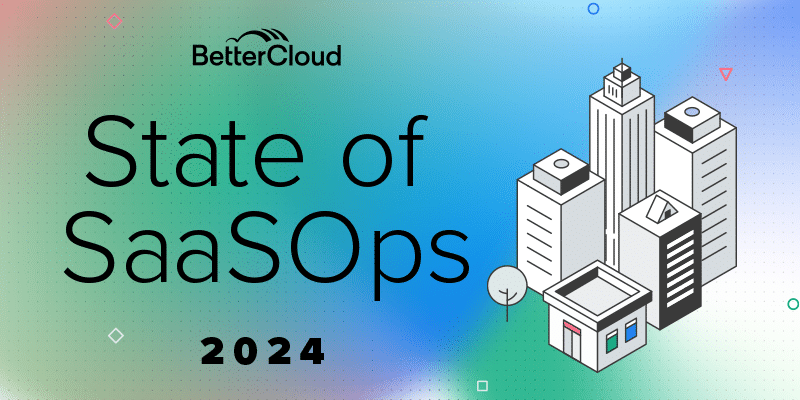Is SaaSOps the New DevOps?
March 11, 2021
6 minute read

Before we begin this discussion, let’s get one thing out of the way: No, we are not comparing SaaSOps to DevOps just because the terms look similar.
In fact, the beginnings of the SaaSOps movement are similar to the early days of DevOps. Both movements emerged as the result of industry-wide frustrations over how slowly things moved and how poorly things got done. Both practices rely on workflows to protect organizations against new and emerging risks. And both have insanely passionate communities of practitioners who swear that these movements are the future.
Since the histories of SaaSOps and DevOps are so similar, I think it’s fair to ask if SaaSOps is the new DevOps. Let’s dive in, shall we?
OK, what would it mean for SaaSOps to be the new DevOps?
When I sat down to write this post, I had a hard time getting started because I wasn’t sure what it would mean for SaaSOps to be the new DevOps. Eventually, I posed the following three questions to myself, including:
Will SaaSOps replace DevOps?
No, and I don’t think that’s the goal. SaaSOps is a practice referring to how SaaS applications are discovered, managed, and secured through centralized and automated IT operations. DevOps is a practice that combines software and IT operations to shorten the development cycle and deliver high-quality software. The terms look similar, but they serve much different (and sometimes complementary) purposes.
Will SaaSOps become more popular than DevOps?
Now this is a much more interesting conversation. SaaS adoption rates continue to explode, and all signs indicate that this isn’t a flash in a pan. Statista predicts that the worldwide SaaS market size will reach $138 billion by 2022, a significant increase over the $101 billion market size it estimated in 2020.
So the calculus here isn’t too difficult. As more enterprises adopt SaaS applications, it’s not hard to imagine a world in which most companies have dedicated SaaSOps teams. There’s a fairly straightforward roadmap for SaaSOps to become more popular than DevOps.
Could SaaSOps become the next “big” thing in tech?
This is also an interesting question to pose for this discussion. Everything I’ve read about DevOps makes it clear that while it’s controversial at times, developers think that it’ll be critical to their organizations’ success (or failure) in delivering quality software.
We’re already seeing signs that SaaSOps is already the next big thing in tech. Although the SaaSOps Community is less than five years old, it already has 5,000 people and is growing on a daily basis. This is just one of many reasons I think it’s worth exploring if the growth of SaaSOps as a practice mirrors the trajectory that DevOps has been on. At what point will SaaSOps be as ubiquitous in the enterprise as DevOps has become?
OK, so we have a better understanding of which question we’re trying to answer here. Before we go too deep, let’s take a look at each movement’s origin story. How did we get to the point where we’re even discussing SaaSOps vs. DevOps?
Two movements born out of necessity
The origins of SaaSOps and DevOps are eerily similar. Let’s quickly review:
- SaaSOps: a movement that emerged in 2019 at BetterCloud’s Altitude conference as SaaS usage exploded and created unique IT operations and security risks
- DevOps: a movement introduced back in 2008 at the Agile Conference in Toronto, in response to mounting concerns between developers and system administrators
These are wildly dumbed-down origin stories. But no matter how you slice it, it’s clear that SaaSOps and DevOps both gained momentum thanks to widespread concerns about how we build and secure software.
And as our CEO David Politis wrote in his second book, DevOps and SaaSOps both evolved from similar goals. “In the same way that DevOps was born out of a need for faster deployment (with fewer defects), SaaSOps was born out of a need for faster, more efficient management of SaaS apps (with less human error),” he adds.
Much like DevOps, SaaSOps is a broader practice that consists of a really unique set of processes, philosophies, and culture. Plus, both practices rely on specific tooling that practitioners swear by. When you think of DevOps, you also think of platforms like Docker or Puppet. When you think of SaaSOps, folks generally think of all the different types of tools you need to support a best-in-breed software strategy, like SaaS management platforms (SMPs), IAM, AITSM, etc.
This is the part of the post where I started to wonder if…this was the end of the blog post.
If DevOps and SaaSOps were both born out of necessity, surely SaaSOps is on a similar trajectory towards becoming the next thing in tech. It’s already proven to be critical to the success of any organization that uses SaaS. Maybe the answer to my original question is that yes, SaaSOps is likely the thing that everyone in tech will be talking about 15 years from now. Maybe SaaSOps engineers will outnumber DevOps engineers in the future.
Or as I discovered, maybe SaaSOps is on an even faster track to becoming the thing.
The (lack of) debate around SaaSOps
DevOps has been around for over a decade longer than SaaSOps. But when you dive into the comparison, you’ll quickly discover that the need for a SaaSOps practice isn’t nearly as debated as DevOps.
Surprisingly, the practice of DevOps isn’t quite as widespread as you might assume. In a 2020 survey, Atlassian found that 46% of organizations are relatively new to DevOps with under three years of doing it. That’s pretty remarkable when you consider that the initial movement began in 2008. Sure, there was an audience of just one person in the early days, but there’s no denying that DevOps isn’t exactly the new kid on the block.
But in the (almost) 16 months since our CEO David Politis announced the first definition of SaaSOps, there’s already a growing consensus that IT needs a centralized platform to discover, manage, and secure their SaaS applications.
We discovered just a few reasons for this last year as part of our 2020 State of SaaSOps survey:
- Companies estimate that 70% of the business apps they use today are SaaS-based
- Only 49% of IT organizations inspire confidence in their ability to identify and monitor unsanctioned SaaS usage on company networks
- IT organizations spend an average of 7.12 hours offboarding a single employee
Recent analyst reports have come up with similar findings. According to Gartner’s Market Guide for SaaS Management Platforms 2021, 50% of organizations using multiple SaaS applications will centralize management and usage metrics of these apps using a SaaS management platform (SMP) by 2026. As our Chief Business Strategy Officer Shreyas Sadalgi wrote, this report aligns with BetterCloud’s vision for an ideal SaaSOps practice.
OK, that’s a lot to take in. Here’s the TL;DR version:
- According to Atlassian, just under 50% of companies are still “new” to DevOps
- According to Gartner, 50% of organizations will use a SaaS management platform to secure their cloud-based environments by 2026
Folks in the industry still can’t decide if DevOps is a paradigm shift. On the other hand, there’s a huge groundswell amongst IT admins that suggests that SaaSOps is not only a paradigm shift, but a critical one to ensure your organization’s future success.
A rapidly growing population of SaaSOps engineers
It’s hard to pin down exactly when the term “DevOps” appeared in a title, but experts were still debating whether it’s a methodology or a job description as recently as 2014.
Out of curiosity, I searched LinkedIn to see how many people consider themselves DevOps Engineers. In the United States, I found about 170,000 results. The same search for folks with the term “SaaS Operations” in their job title returns just over 660 results.
It’s important to remind you once again that DevOps has been around much longer than SaaSOps. In the time since Politis announced the definition, we’ve seen a variety of job titles enter the market, including:
- SaaS Operations Supervisor
- VP, SaaS Operations
- SaaS Operations Engineer
- SaaS Operations Lead
Recent studies suggest that we’ll see more of these titles appear on LinkedIn over the next few years. 30% of the respondents to our 2020 State of SaaSOps survey said that they either use the term “SaaSOps” in their job titles or plan to include it soon. Additionally, take a second to search for open SaaS operations jobs on Indeed. You’ll find 145 openings across the United States.
These are staggering numbers for a practice that has only had an official definition since 2019. In a conversation about which methodology is set to become the “next” DevOps, the growing number of IT professionals with some version of “SaaS Operations” in their job titles is another indication that SaaSOps is (and might already be) the practice that has everyone in tech buzzing over the next decade.
Want to learn more about how you can develop a SaaSOps practice and discover, manage, and secure your SaaS environment with an SMP like BetterCloud? Click here to schedule a demo.






